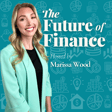
Should You Pay Off Debt or Invest? | Listener Q&A with Marissa Wood
- In this solo Q&A episode of The Future of Finance, Marissa Wood, co-founder of Union Financial Services, tackles your most pressing financial questions with clarity and real-life examples. From daily coffee habits to mortgage payoffs and investing for your kids’ futures, this episode breaks down key concepts in a way that’s easy to understand—and apply.
Whether you're just starting your financial journey or already investing, this is the perfect episode to fine-tune your strategy and build confidence in your money decisions.
⏱ Timestamps:
0:00 – Intro: Marissa’s Listener Q&A Special
0:32 – Does Buying Coffee Daily Really Hurt Your Financial Future?
2:07 – What Skipping Coffee Could Be Worth in 30 Years
3:34 – Tips for Saving on Coffee Without Giving It Up
4:21 – What Is the S&P 500 & Why It Matters
6:05 – What Is a Stock, Really? Ownership Explained
8:06 – What’s the Difference Between a Stock and a Mutual Fund?
10:33 – Diversifying Through Mutual Funds vs. Individual Stocks
11:08 – Should I Pay Off My Car or Invest Instead?
14:00 – How Much Investment Risk Should You Take On?
15:46 – Understanding Target Retirement Date Funds
17:16 – Should I Put Extra Toward My Mortgage Each Month?
20:19 – New Baby? What to Do Financially to Set Your Child Up for Success
🔗 Ready to take the first step?
Visit https://www.union-financial.com/ to schedule a free consultation.
💬 If this episode moved you or gave you a new perspective, please like, comment, and share it with someone who needs to hear this.
